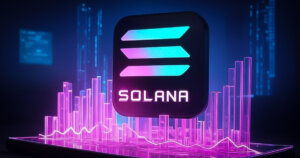 BIS urges caution as finance industry embraces asset tokenization
BIS urges caution as finance industry embraces asset tokenization BIS urges caution as finance industry embraces asset tokenization
The BIS report, published on Oct. 21, stressed that while the benefits of tokenization are clear, the risks cannot be ignored.

Cover art/illustration via CryptoSlate. Image includes combined content which may include AI-generated content.
The Bank for International Settlements (BIS) has issued a cautionary report as traditional financial institutions accelerate their exploration of tokenization, raising concerns over governance, legal frameworks, and financial stability.
Tokenization, which converts real-world assets (RWA) like property and securities into digital tokens, has drawn attention for its ability to streamline transactions and reduce costs. Mechanisms like delivery-versus-payment (DvP) and payment-versus-payment (PvP) could help mitigate risks in financial markets.
According to the BIS:
“Tokenization could reshape market structures by cutting transaction costs and improving settlement processes.”
However, the BIS report, published on Oct. 21, stressed that while the benefits are clear, the risks cannot be ignored.
Regulatory uncertainty
Despite these promising benefits, the BIS report emphasized that tokenized assets face significant legal and regulatory uncertainties. One key concern is whether existing laws extend to tokenized versions of financial products.
For example, in the US, traditional repurchase agreements (repos) are shielded by automatic bankruptcy protections — yet it’s unclear if tokenized repos would receive the same legal treatment.
The report also raised concerns about how tokenization could disrupt the roles of central banks in payments, monetary policy, and financial oversight.
The BIS stressed that policymakers need to assess potential trade-offs between different types of settlement assets and ensure proper regulation of private sector initiatives to maintain stability.
RWA Tokenization growth
Despite the risks, financial institutions like Barclays, Citi, and HSBC are moving ahead with tokenization projects. Trials such as the UK’s Regulated Liability Network (RLN) are already exploring the feasibility of tokenized deposits and programmable payments.
The sector for tokenized real-world assets (RWAs) is projected to grow dramatically in 2024 and beyond. Tren Finance estimates the market could swell to anywhere from $4 trillion to $30 trillion by the decade’s end.
Even a median estimate of $10 trillion would represent a massive jump from the current $185 billion, which includes stablecoins.
As the push for tokenization gains momentum, the BIS report serves as a timely reminder that while the technology holds great promise, it comes with costs that require careful regulatory oversight.
The report stated:
“Efficiency gains will not come without significant investment and coordination.”
With tokenization poised to reshape finance, collaboration between the public and private sectors will be essential in mitigating risks and unlocking its full potential.






























































































